In this digital age, the importance of having terms and conditions for your website can’t be overstated even though it’s not the first thought that comes to mind when launching your website.
While not a legal requirement, it is essential for protecting your online business from potential legal issues, safeguarding intellectual property, and building trust with users.
In this article, I’ll explain the key reasons why any website should have terms and conditions, regardless of whether you’re a big eCommerce store or don’t sell anything and run your site just as a hobby.
So if you’re asking yourself “does my website need terms and conditions?”, you’re in the right place.
I’ll also touch on the consequences of not having these terms and why you should think twice before skipping this step.
- Terms and conditions safeguard online businesses from potential legal issues and are essential even for websites that don’t sell anything.
- Key components include legal compliance, intellectual property protection, liability limitations, payment and refund policies, user responsibilities, and content policies.
- Not having terms and conditions can lead to legal vulnerability, misuse, intellectual property infringement, and costly disputes, despite it not being a legal requirement.
Table of Contents
PRO TIP: Take the hassle of writing your own terms and conditions away with our terms and conditions generator trusted by over 200,000 businesses. It’ll save you hours of work and possible costly legal mistakes.
Why Do I Need Terms and Conditions On My Website?
Yes, having terms and conditions on your website is highly recommended. Here are ten reasons why terms and conditions are important for any website or online business, even if you don’t sell anything:
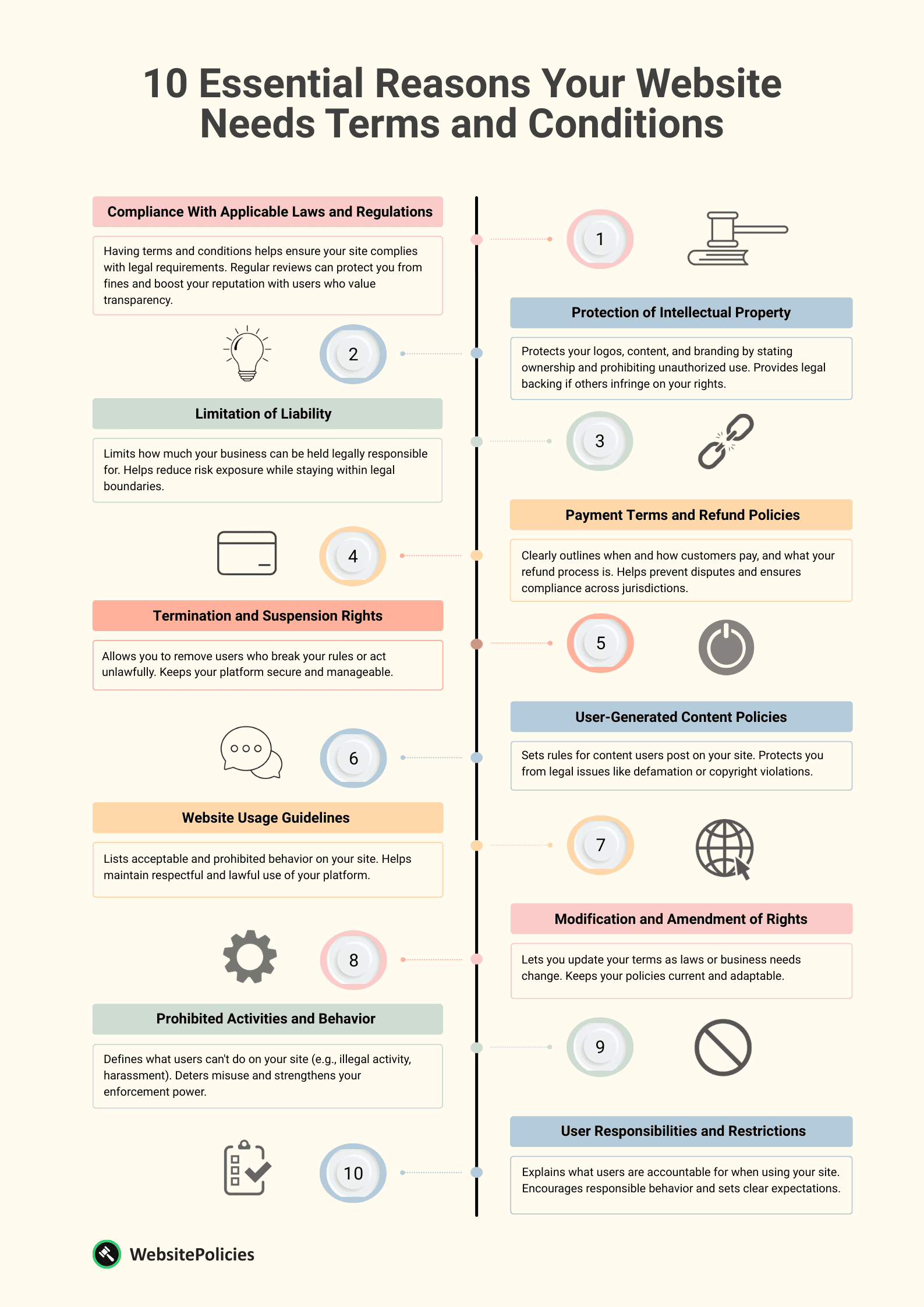
1. Compliance With Applicable Laws and Regulations
I would advise you to regularly review your terms and conditions to ensure compliance with all relevant laws and regulations. Making sure of legal compliance can save your business from costly fines and penalties, and it can also boost your reputation among customers who value businesses that respect their rights.
2. Protection of Intellectual Property
I would recommend including explicit provisions in your terms and conditions to protect your intellectual property rights. These provisions should outline what your intellectual property consists of and clearly state that unauthorized use is prohibited.
This can deter others from infringing on your rights and provide you with legal recourse if they do.
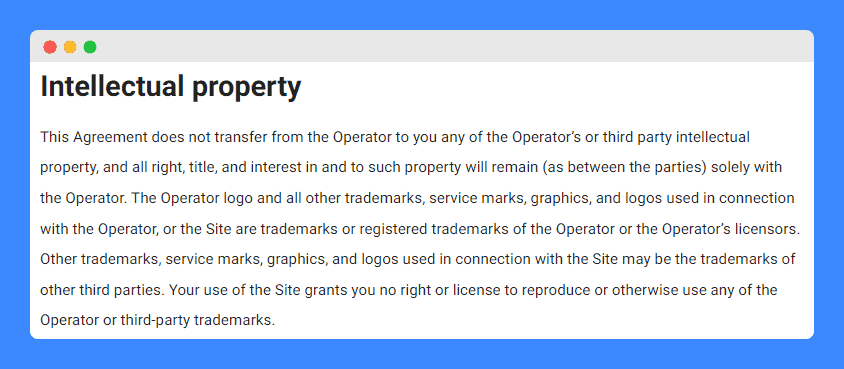
3. Limitation of Liability
From a legal standpoint, it is prudent to include a limitation of liability clause in your terms and conditions. This clause should limit your liability to the fullest extent permissible under law and should be tailored to the specific risks associated with your business.
Remember, the goal is not to avoid all liability but rather to limit liability to a level that you are comfortable with and which is legally acceptable.
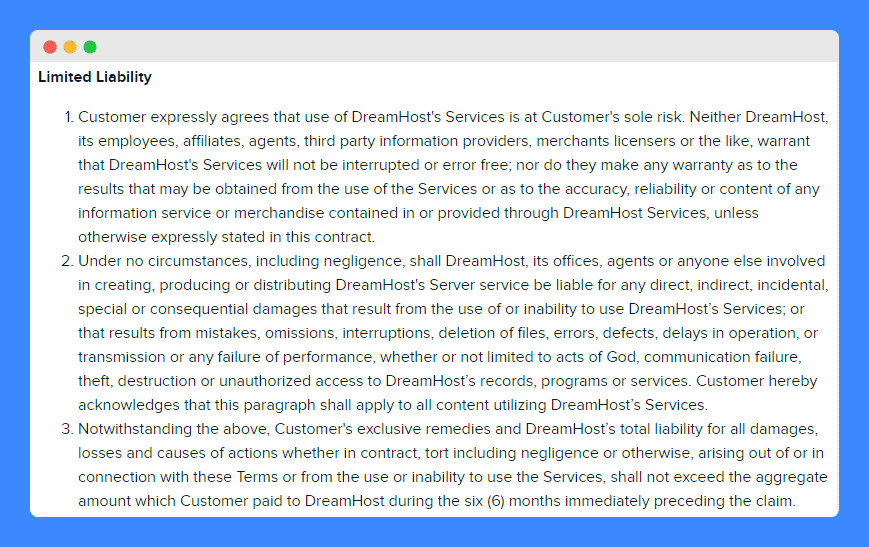
4. Payment Terms and Refund Policies
I would suggest specifying in clear language the payment terms for your products or services and your refund policy. By clearly outlining these terms, you can help prevent disputes and misunderstandings with customers.
Additionally, if your business operates across different jurisdictions, make sure your payment and refund policies comply with the laws of all relevant countries.
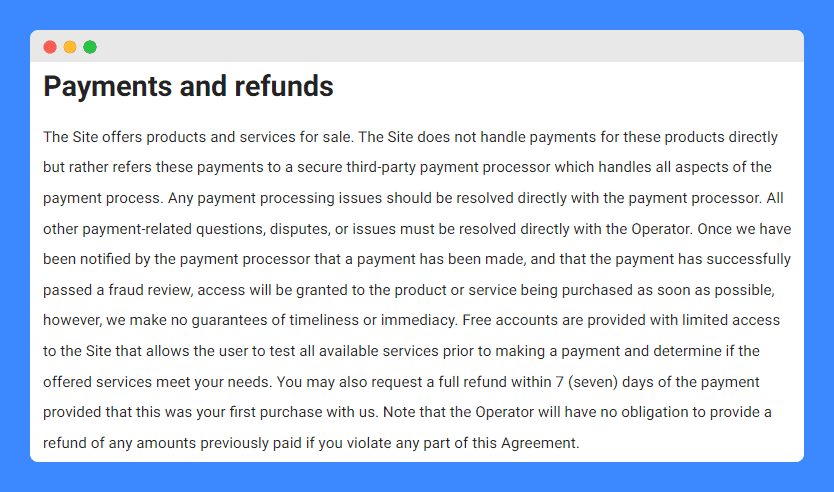
5. Termination and Suspension Rights
You should include provisions that allow your business to terminate or suspend user accounts in certain situations.
The language should specify the circumstances that can trigger such actions, such as violation of your terms and conditions or any unlawful activity.
This helps maintain the integrity of your platform and protects your business from potential liability.
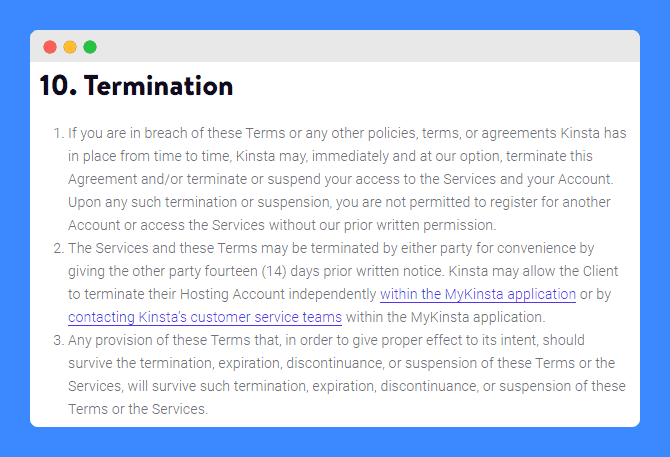
6. User-Generated Content Policies
If your platform allows users to generate content, I strongly advise including clear guidelines about what is and isn’t acceptable.
This helps protect your business from legal issues related to defamation, copyright infringement, and other potential risks associated with user-generated content.
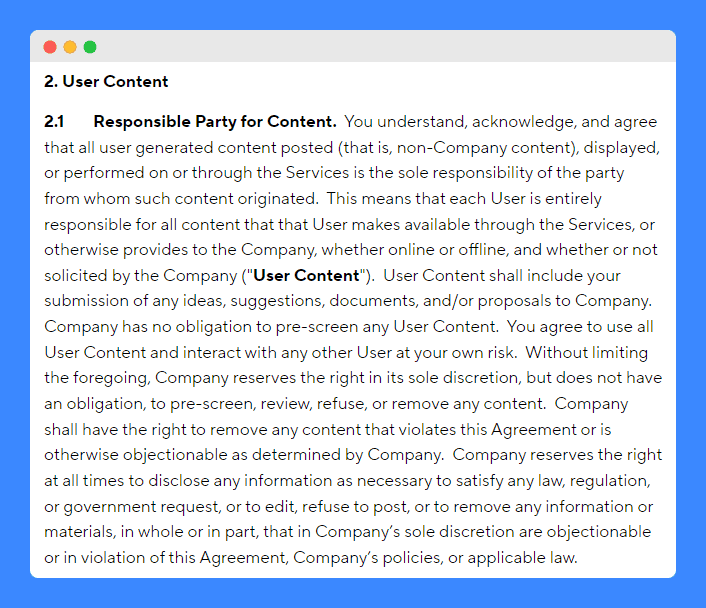
7. Website Usage Guidelines
By including guidelines on how users can and cannot use your website, you help set clear boundaries and expectations for user behavior.
This can prevent misuse of your website, protect your resources, and maintain a respectful and lawful online community.
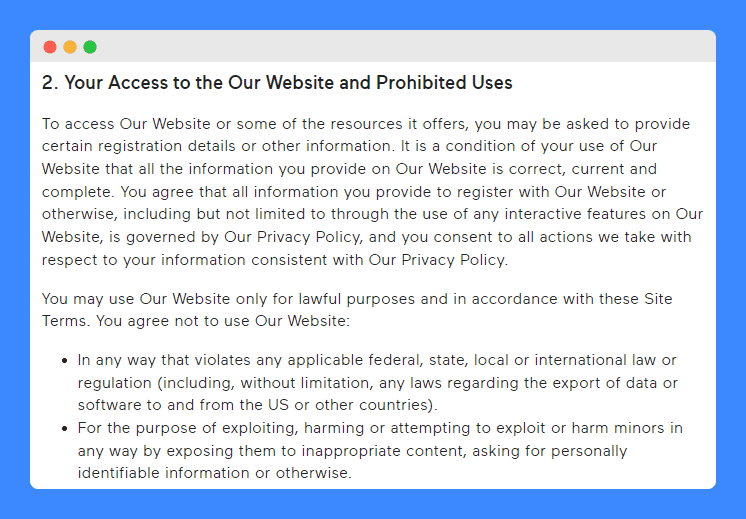
8. Modification and Amendment of Rights
I suggest you reserve the right to modify or amend your terms and conditions as needed. This allows your business to stay current with evolving laws and regulations, and to adjust terms based on the changing needs of your business and customers.
9. Prohibited Activities and Behavior
A section outlining specific activities and behavior that are prohibited can serve as a deterrent against misuse and as a means of protecting your business. Ensure this section is comprehensive, clear, and enforceable.
10. User Responsibilities and Restrictions
Finally, your terms and conditions should clearly outline what users are responsible for and what restrictions they must abide by when using your services. This clarifies the role of users in your ecosystem and ensures they are aware of their obligations.
Are Terms and Conditions Legally Required?
While it’s not legally required for websites to have terms and conditions, it’s considered best practice to do so, especially if your website is involved in e-commerce, collects user data, or allows user-generated content (though it doesn’t have to!).
Without a terms and conditions page, your website could be exposed to potential legal risks.
For example, if a user abuses your site or causes harm to others through your site, you may have limited recourse if you don’t have clear terms and conditions stating that such behavior is not allowed.
PRO TIP: Having terms and conditions available can help to build trust with your users. It tells them that you have a clear set of rules for your website and that you are committed to operating in a professional and legal manner.
What Happens if My Website Doesn’t Have Terms and Conditions?
Not having terms and conditions on your website can expose you to various risks and consequences. Without clear guidelines, you may face legal vulnerability, leaving you susceptible to disputes and conflicts.
Users may interpret your website’s usage and services differently, potentially leading to disagreements.
Additionally, without specified rights and responsibilities, users may not understand their obligations, resulting in misuse or inappropriate behavior.
By omitting intellectual property clauses, you may lack legal protection for your website’s content, designs, and branding. This could lead to unauthorized use or infringement by others.
Imagine seeing your images or content on a different website used without your permission, you probably wouldn’t be too happy about it, right?
The absence of dispute resolution provisions could make it difficult to address conflicts effectively, potentially resulting in costly legal battles. Furthermore, you may be held responsible for issues or damages caused by users.
That’s just a short list of things that can go wrong but I’m sure you get the picture.
Remember, while it’s not a legal requirement to have terms and conditions, it is highly recommended, especially if your website is selling products or services.
Frequently Asked Questions
Why are terms and conditions important for a website?
Terms and conditions protect your online business from potential legal issues, safeguard intellectual property, and build trust with users. They also ensure compliance with laws and regulations.
Is it legally required to have terms and conditions on my website?
No, it’s not legally required but it’s considered best practice. Without them, your website could be exposed to potential legal risks, especially if it’s involved in e-commerce or collects user data.
What should terms and conditions include to protect intellectual property?
They should have explicit provisions outlining what your intellectual property consists of, stating that unauthorized use is prohibited. This deters infringement and provides legal recourse.
What happens if my website doesn’t have terms and conditions?
Without terms and conditions, your website may face legal vulnerability and disputes. Users may misuse your services, and your intellectual property may be used without permission, leading to potential legal battles.



